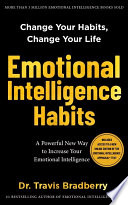

Emotional Intelligence (EI) is the ability to recognize, understand, and manage our own emotions as well as the emotions of others. It encompasses self-awareness, self-regulation, social awareness, and relationship management. The book emphasizes that EI is not just an innate ability but a skill that can be developed over time. By cultivating emotional intelligence, individuals can improve their communication, conflict resolution, and overall interpersonal relationships. The author explores the science behind EI, citing studies that show how individuals with higher emotional intelligence tend to have better mental health, job performance, and leadership skills. The concept is positioned as essential for personal and professional success, and the book provides practical strategies for enhancing one's EI through daily habits.
Continue readingSelf-awareness is a cornerstone of emotional intelligence. It involves recognizing one's emotions, strengths, weaknesses, values, and drivers. The book details methods for increasing self-awareness, such as mindfulness practices, reflective journaling, and seeking feedback from others. By understanding our emotional triggers and responses, we can make more informed decisions and act with intention rather than react impulsively. The author emphasizes that self-awareness leads to better emotional regulation, enabling individuals to navigate challenging situations with composure and clarity. This foundational habit is crucial for personal growth and effective leadership.
Continue readingSelf-regulation refers to the ability to manage one's emotions and behaviors in various situations. The book discusses techniques for developing self-regulation, such as breathing exercises, cognitive reframing, and establishing personal boundaries. By practicing self-regulation, individuals can respond to stressors more effectively, reducing the likelihood of emotional outbursts or rash decisions. This habit is particularly important in high-pressure environments where emotional responses can have significant consequences. The author illustrates how self-regulation contributes to resilience and adaptability, qualities that are increasingly valuable in today’s fast-paced world.
Continue readingSocial awareness is the ability to empathize with others and understand social dynamics. The book explores the importance of active listening, observing non-verbal cues, and being attuned to the emotional states of others. By enhancing social awareness, individuals can build stronger relationships, foster collaboration, and navigate social complexities more effectively. The author provides exercises to practice empathy and improve interpersonal skills, highlighting how these traits are essential for effective teamwork and leadership. The chapter emphasizes that social awareness not only benefits personal interactions but also contributes to a positive organizational culture.
Continue readingThe ability to build and maintain healthy relationships is a key aspect of emotional intelligence. The book outlines strategies for effective communication, conflict resolution, and trust-building. The author stresses the importance of vulnerability and authenticity in relationships, encouraging readers to foster connections based on mutual respect and understanding. By cultivating strong relationships, individuals can create supportive networks that enhance personal and professional growth. The chapter includes practical tips for improving relationship skills, such as expressing appreciation, providing constructive feedback, and being open to different perspectives.
Continue readingEmotional intelligence is particularly crucial in leadership roles. The book discusses how leaders with high EI can inspire and motivate their teams, manage conflicts, and create a positive work environment. The author provides examples of successful leaders who exemplify emotional intelligence and highlights the correlation between EI and effective leadership outcomes. The chapter emphasizes that emotional intelligence is not just a 'nice to have' but a critical component of successful leadership. The author offers insights into how aspiring leaders can develop their emotional intelligence to enhance their leadership capabilities.
Continue readingThe book concludes by emphasizing the importance of creating habits that foster emotional intelligence over time. The author provides a framework for habit formation, encouraging readers to set specific, measurable goals for their emotional intelligence development. By integrating EI practices into daily routines, individuals can make lasting changes that enhance their emotional intelligence. The chapter includes actionable steps for tracking progress and maintaining motivation, reinforcing the idea that emotional intelligence is a lifelong journey rather than a destination. The author encourages readers to view their emotional intelligence as a dynamic skill set that can evolve with practice.
Continue readingThe reading time for Emotional Intelligence Habits depends on the reader's pace. However, this concise book summary covers the 7 key ideas from Emotional Intelligence Habits, allowing you to quickly understand the main concepts, insights, and practical applications in around 26 min.
Emotional Intelligence Habits is definitely worth reading. The book covers essential topics including Understanding Emotional Intelligence (EI), The Role of Self-Awareness, Practicing Self-Regulation, providing practical insights and actionable advice. Whether you read the full book or our concise summary, Emotional Intelligence Habits delivers valuable knowledge that can help you improve your understanding and apply these concepts in your personal or professional life.
Emotional Intelligence Habits was written by Travis Bradberry.
If you enjoyed Emotional Intelligence Habits by Travis Bradberry and want to explore similar topics or deepen your understanding, we highly recommend these related book summaries:
These books cover related themes, complementary concepts, and will help you build upon the knowledge gained from Emotional Intelligence Habits. Each of these summaries provides concise insights that can further enhance your understanding and practical application of the ideas presented in Emotional Intelligence Habits.